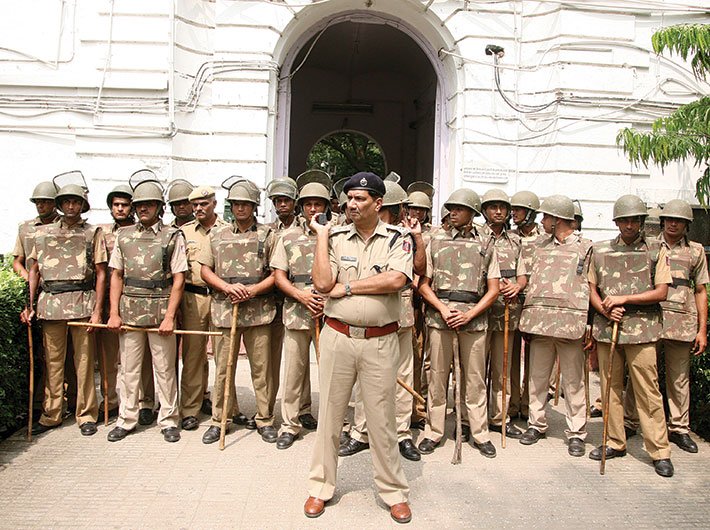Buckled under the will of political executive and now private players, police find it difficult to reach out its helping hand to the public
In 1996, two retired director generals of police (DGPs) – Prakash Singh and NK Singh – along with consumer activist HD Shourie, filed a public interest litigation (PIL) in the supreme court (SC) to bring about a change in the policing system. After serving years in police force, the main petitioner Prakash Singh was frustrated with the constant interference of politicians and bureaucrats in the department. The officer strongly felt that the archaic Police Act of 1861 needed to be reviewed.
After a decade of struggle, in September 2006, the SC, in a landmark judgment, gave several directions to the centre and states to deal with numerous issues plaguing the policing system. Though on one hand, many states turned a blind eye to the court’s decision. On the other hand, others just made some cosmetic changes for the sake of adhering to the court’s orders. Such apathetic approach towards police reforms is nothing new in India.
In 1977, National Police Commission (NPC) was constituted to take a comprehensive review of the police system. In subsequent years, the commission came out with several reports recommending modalities for inquiry into complaints of police misconduct, securing professional independence for the police, and constituting statutory commissions in each state to lay down broad policy guidelines for the performance of preventive task and service oriented functions by the police. All of these recommendations, however, remained active only on paper.
Moreover, in the late 1990s and early 2000s, a number of committees – the Ribeiro committee, the Padmanabhaiah committee and the Soli Sorabjee committee – were set up to find solutions to the problems afflicting the police system. Though many of their recommendations were concrete, the implementation of the same was fragile.
In November 2014, PM Modi devised a new acronym for the police, SMART – strict and sensitive, modern and mobile, alert and accountable, reliable and responsive, and trained and techno-savvy. But the question of how the same could be achieved remains unanswered. “Over 300 recommendations have been made by various committees and commissions set up on police reforms. So, by saying that we are going to achieve SMART police, you are just adding one more recommendation. But without its proper implementation, it is meaningless. The larger question here is why so many recommendations have not been implemented yet,” says Dhirendra Singh, former union home secretary.
The BJP, in its 2014 general elections manifesto, had promised a slew of initiatives to improve working conditions of the police force and make it more efficient. The centre, however, finds it difficult to deliver on these promises since police is a state subject. The possessiveness of the states towards the territory they control is so strong, that they had even defied the SC in past.
Role of the state
In 2006, the SC had directed all the states to form a state security commission (SSC), which would act as a buffer body between the police and the legislature to ensure that the state government does not exercise unwarranted influence or pressure on the state police. Maharashtra and Uttar Pradesh, however, had initially declined to set up an SSC arguing that police was a state matter and thus the court could not question them on non-compliance of its “recommendations”.
Even when the states did comply with the directives, they had a lackadaisical approach in implementing the schemes. “There are states which pass their own laws and feel they are beyond the court’s orders, and then there are states which pass executive orders but the compliance is farcical,” says Prakash Singh, former DGP of UP.
The centre, though, can work well with the states when it comes to handling inter-state and transnational crimes. “The grey area, wherein a crime is not restricted to one state and requires the centre’s intervention, needs to be strengthened,” says Dhirendra Singh. This becomes all the more important as at times a state refuses to cooperate with the centre. In October last, West Bengal chief minister Mamata Banerjee had initially opposed any intervention of the National Investigating Agency (NIA) in the Burdwan blast case after the NIA took over the investigation. The state governments have never been comfortable with the centre trying to have its way in matters of law and order. It was for this very reason that the proposed national counter terrorism centre, mooted in wake of the 2008 Mumbai terror attacks, has not seen the light of the day.
This, however, is not to say that police forces in several states have not taken any measure on their own to improve work efficiency and provide better services. Yet, many a time the impact and the intent becomes questionable. In 2013, the Mumbai police established a social media lab to monitor and, if need be, block or take down “objectionable” content from the internet to prevent any situation which disrupts law and order. As part of their new role, in 2015, the Mumbai police blocked several social media posts of controversial cartoons which were featured in the French satirical magazine Charlie Hebdo. There was a huge outcry over this move on the social media, accusing the Mumbai police of violating freedom of speech and expression.
In another case, the Bengaluru police in November last year launched a unique remote FIR registration kiosk. With this, one need not go to a police station to file an FIR but simply step into Mantri mall, in west Bengaluru, and interact with an investigating officer via video conferencing. Sounds good. But Saurav Datta, programme officer for police reforms at Commonwealth Human Rights Initiative, thinks otherwise. “It is not that the police is making things easier for the public. The police should rather create an image which eradicates fear among the public in visiting a police station, rather than taking such shortcuts.”
Modernising the police system has been the keyword lately for almost every state police department. Datta, however, feels that in the name of modernisation, many important policing aspects have been ignored. “The hallmarks of modernisation for the police are either installation of CCTV cameras or carrying out crime mapping. Due to these, the police is losing interest in its on-the-ground intelligence gathering skills, as it is now relying heavily on modern technology. Moreover, by merely recognising a section of population in a community that is considered crime-prone, the tool of crime mapping gives rise to prejudice against innocent people living in that area,” says Datta.
The other side
“From my lifetime experience, I have seen that the police force is struggling with politicians and bureaucrats, thus not leading to any structural reforms,” says Prakash Singh. This was one of the prime reasons which prompted him to file the PIL in 1996. But in the recent past a more disturbing trend has crept in. It is the role of private players and individuals in matters of police security services.
In 2009, the Federation of Indian Chambers of Commerce and Industry (FICCI) came out with a task force report on national security and terrorism. Though the report primarily talked about the growing threat of terrorism in India and ways to tackle the same, it also, at several instances, pointed out the need for the government to address security concerns of the private sector. In the same year, the parliament passed the central industrial security force (amendment) Bill of 2008, paving way for the private industries to receive CISF security cover on cost reimbursement basis. Soon after, Infosys became the first private company to avail CISF security cover for its complex located in Bengaluru. However, warns Datta, “A scenario of a public-private partnership in the police would be just disastrous.”
Reforms in the police cannot be looked in a one-dimensional manner. As Datta says, it is all tied up and one cannot really prioritise a particular reform. “For example, it is an established argument that police needs to be accountable. But a major reason why police personnel many a times tend to become brutal is because they are made to work for endless hours, which leads to an imbalance in their personal lives. So a reform regarding better working conditions for the police is also necessary.” Similarly, commenting on the SMART initiative, Prakash Singh says that “sensitivity to the common man by the police comes by independence in action. But if the police remains under the thumb of extraneous influences, it cannot be achieved.”
The need for reforms has never really attracted the attention of any government, be it the centre or the state. “The problem is that we have never looked at policing as a subject of study. Criminology is at a very nascent stage in India,” says Datta. “It is the people who will need to raise their voice,” says Prakash Singh, adding, “What we have today are the ruler’s police. What we need are the people’s police.”

